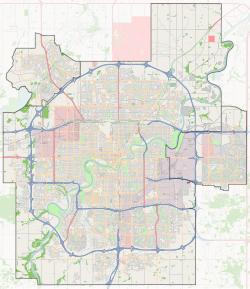Hillview | |
|---|---|
Neighbourhood | |
Location of Hillview in Edmonton | |
| Coordinates: 53°28′08″N 113°25′44″W / 53.469°N 113.429°W | |
| Country | |
| Province | |
| City | Edmonton |
| Quadrant[1] | NW |
| Ward[1] | Karhiio |
| Sector[2] | Southeast |
| Area[3][4] Community | Mill Woods Woodvale |
| Government | |
| • Mayor | Amarjeet Sohi |
| • Administrative body | Edmonton City Council |
| • Councillor | Keren Tang |
| Area | |
| • Total | 1.1 km2 (0.4 sq mi) |
| Elevation | 698 m (2,290 ft) |
| Population (2012)[7] | |
| • Total | 3,447 |
| • Density | 3,133.6/km2 (8,116/sq mi) |
| • Change (2009–12) | |
| • Dwellings | 1,389 |
Hillview is a residential neighbourhood in the Mill Woods area of south Edmonton, Alberta, Canada. It is located in the Woodvale area of Mill Woods.
The neighbourhood was largely developed during the 1970s and early 1980s. It was during this time that 87% of the neighbourhood residences were constructed.[8]
Just over half (54%) of the residences in the neighbourhood are single-family dwellings. Another quarter (24%) are row houses. Apartments constitute another 16% with duplexes[9] accounting for 5% of all residences. According to the 2005 municipal census, 68% of residences were owner occupied with the remainder being rented.[10]
The average household size in Hillview is 2.9 persons. Just under half (47%) of residences have one or two persons. Approximately one in five households (19%) have three persons, and almost one in three households (30%) have four or five persons.[11]
There are two schools in the neighbourhood. The Hillview Elementary School is operated by the Edmonton Public School System, while the John Paul I Catholic Elementary School is operated by the Edmonton Catholic School System.
The Grey Nuns Community Hospital is located to the south in the adjoining neighbourhood of Tawa. On the far side of Tawa is Mill Woods Town Centre.
Hillview is bounded on the west by 66 Street, on the east by 50 Street, on the south by 34 Avenue, and on the north by 38 Avenue.
The community is represented by the Woodvale Community League, established in 1980.[12][13]
- ^ a b "City of Edmonton Wards & Standard Neighbourhoods" (PDF). City of Edmonton. Archived from the original (PDF) on May 7, 2015. Retrieved February 13, 2013.
- ^ "Edmonton Developing and Planned Neighbourhoods, 2011" (PDF). City of Edmonton. Archived from the original (PDF) on October 6, 2014. Retrieved February 13, 2013.
- ^ "The Way We Grow: Municipal Development Plan Bylaw 15100" (PDF). City of Edmonton. 2010-05-26. Archived from the original (PDF) on May 2, 2015. Retrieved February 13, 2013.
- ^ "City of Edmonton Plans in Effect" (PDF). City of Edmonton. November 2011. Archived from the original (PDF) on October 17, 2013. Retrieved February 13, 2013.
- ^ "City Councillors". City of Edmonton. Retrieved February 16, 2014.
- ^ "Neighbourhoods (data plus kml file)". City of Edmonton. Retrieved February 13, 2013.
- ^ Cite error: The named reference
2012populationwas invoked but never defined (see the help page). - ^ "2001 Federal Census - Period of Construction - Occupied Private Dwellings" (PDF). City of Edmonton.
- ^ Duplexes include triplexes and quadruplexes.
- ^ "2005 Municipal Census - Dwelling Unit by Structure Type and Ownership" (PDF). City of Edmonton.
- ^ "2001 Federal Census - Households by Size" (PDF). City of Edmonton.
- ^ "Woodvale Community League". Woodvale Community League. Retrieved 2012-11-27.
- ^ Kuban, Ron (2005). Edmonton's Urban Villages: The Community League Movement. University of Alberta Press. ISBN 9781459303249.
